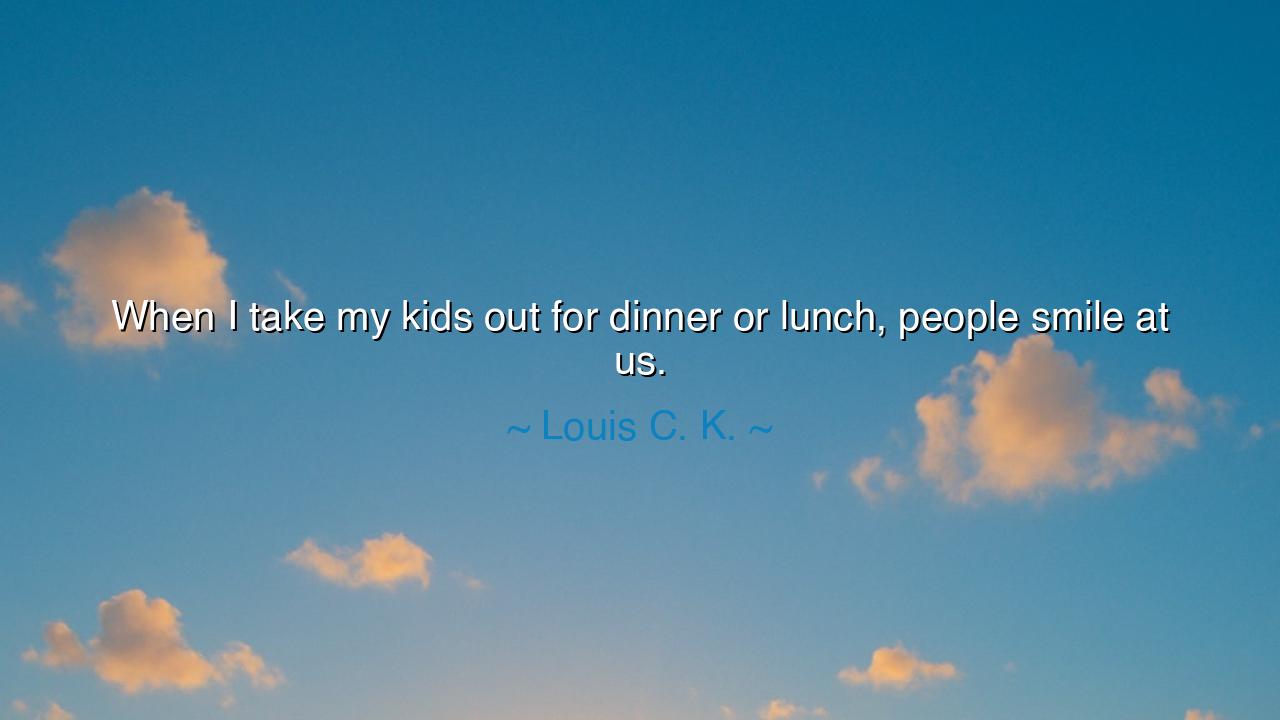
When I take my kids out for dinner or lunch, people smile at us.






The words of Louis C. K. are simple, yet within them dwells a truth as old as mankind itself: “When I take my kids out for dinner or lunch, people smile at us.” At first glance, it is a passing observation, almost casual. But beneath its quiet tone lies the recognition of a universal law—that the sight of family, of parent and child sharing bread, awakens in the human heart a joy that transcends the self. The smile of the stranger is not for the meal, nor for the man, but for the harmony of life continuing, for the sacred thread of generations unbroken.
To witness a father with his children is to glimpse the order of the cosmos reflected in earthly form. Just as the sun rises each morning to warm the earth, so too does the parent guide the young, providing light and sustenance. Those who pass by cannot help but smile, for in that sight they are reminded of their own childhood, of their own parents’ hands guiding them. The moment carries with it memory and prophecy—memory of where we have come from, and prophecy of where we are going. In the laughter of children, the world hears its promise of renewal.
History offers us countless visions of this truth. Consider Cincinnatus, the Roman farmer who, though called from his fields to defend the Republic, returned to his plow when duty was done. His greatness was not only in battle, but in his devotion to hearth and home. Imagine the people of Rome seeing him not as conqueror, but as father, guiding his household with the same strength with which he once led legions. Their smiles were not of admiration for wealth or power, but for the sight of a man fulfilling his deepest duty—to nurture life, to hold close those entrusted to him by fate.
The smile of the stranger is itself a kind of blessing, an unspoken prayer whispered through the eyes. It is society’s way of saying: “We see you. We honor you. In raising your children with love, you strengthen us all.” For the work of the parent is not private alone; it is public and eternal. Each meal shared, each small act of care, builds the foundation of tomorrow’s world. And those who look upon it instinctively feel the weight and beauty of that truth.
There is also a lesson here in simplicity. Louis C. K. did not say, “When I win awards” or “When I am on stage, people smile.” No—he spoke of lunch, of dinner, of the ordinary moments. This is where the deepest human connections lie, not in the arenas of fame or conquest, but in the humble table where bread is broken and stories are told. Greatness is not only in monuments or crowns, but in the child’s laughter echoing through a café, in the quiet pride of a father cutting their food.
And so, we must learn to treasure these moments. The world often teaches us to chase after glory, after riches, after titles. Yet the smiles that endure are not for the powerful alone, but for those who embody love and continuity. When you walk with your children, when you sit with them in the marketplace, you carry within you the fire of civilization itself. This is why strangers smile—it is not only at you, but at the reflection of all humanity’s hope.
The teaching, then, is clear: do not overlook the sacredness of the ordinary. Take time to sit with those you love. Share meals not only for nourishment of the body, but for the weaving of the soul’s tapestry. Know that even in the eyes of strangers, these acts are honored, for they recognize that in your care for your children, you care also for the world.
Therefore, let this be your practice: break bread together often, not only in feast days, but in the everyday. Walk with your children in the light of the sun, and let the world see that love. For by such simple acts you become a silent teacher, reminding all who watch that life’s greatest victories are not measured in wealth or applause, but in the quiet smiles that rise unbidden at the sight of love made visible.






AAdministratorAdministrator
Welcome, honored guests. Please leave a comment, we will respond soon